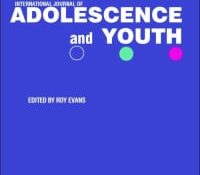eric.ed.gov har udgivet: The teaching of mathematics, which arguably is so abstract as to transcend place and community and even culture (according at least to a Platonic view of mathematics), will seem to some observers particularly ill-suited to instruction in place- or community- or culture-based approaches. Nevertheless, current thinking in mathematics education, with its emphasis on the construction of meaning and the application of problem solving to “real-world” situations, might logically be interpreted as supporting these varied approaches to instruction. Because both rural education and math education scholars collaborated in conducting this study, the project did indeed have its eye as much on the “community purposes of mathematics instruction” as on the “mathematical purposes of community engagement”. The related complexities are legion–and, the authors find, them interesting. This report begins… Continue Reading →
Like this:
Like Loading...
tandfonline.com har udgivet en rapport under søgningen “Teacher Education Mathematics”: ABSTRACT ABSTRACT Global commitments to the education of children with disabilities, have led to progressive policy developments in India, and a surge in the enrolment of children who were traditionally excluded from the formal education system. This paper examines the perceptions and practices of mainstream teachers in rural government schools, within the context of increased learner diversity, focusing on how teachers understand, and respond to, the needs of children with disabilities. Data were collected through semi-structured interviews with teachers and classroom observations, in six primary schools, in three districts of Haryana. Our findings suggest that deficit-oriented views dominated teacher thinking, but they showed a readiness to engage with disability issues, recognising the value of education for all. However, they struggled… Continue Reading →
Like this:
Like Loading...
eric.ed.gov har udgivet: This packet includes reprints of journal articles and other resources concerning the assessment of science and math in small, rural elementary schools. Articles include: (1) “Standards, Assessment, and Educational Quality” (Lauren B. Resnick); (2) “A True Test: Toward More Authentic and Equitable Assessment” (Grant Wiggins); (3) “How World-Class Standards Will Change Us” (Arthur L. Costa); (4) “Smart Tests” (Deborah L. Cohen); (5) “Laser Disk Portfolios: Total Child Assessment” (Jo Campbell); (6) “Portfolios Invite Reflection–from Students and Staff” (Elizabeth A. Hebert); (7) “Portfolio Assessment in the Hands of Teachers” (Clare Forseth); (8) “Portfolio Assessment” (Susan Black); (9) “Assessing the Outcomes of Computer-Based Instruction: The Experience of Maryland” (Gita Z. Wilder, Mary Fowles); (10) “Why Standards May Not Improve Schools” (Elliot W. Eisner); (11) “Assessing Alternative Assessment” (Gene I.… Continue Reading →
Like this:
Like Loading...
eric.ed.gov har udgivet: This study focuses on flexibility provisions in the Rural Education Achievement Program (REAP) provision of NCLB. Specifically, it addresses REAP Flex, a program that allows rural districts additional control over how to spend portions of their federal funding. REAP Flex is part of a series of NCLB flexibility initiatives aimed at rural schools. The four primary findings of this study were: (1) Half of eligible districts participated in the REAP Flex program; (2) REAP Flex authority was most often used to provide additional funds for services under Title I, Part A. Districts also commonly used REAP Flex to focus on programs related to Title V, Part A (State Grants for Innovative Programs), and Title II, Part D (Educational Technology State Grants). The program funds most commonly used… Continue Reading →
Like this:
Like Loading...
eric.ed.gov har udgivet: Improving teacher quality in P-12 mathematics is a national need, and many universities and schools are working to address it. With the support of the National Science Foundation (NSF), twelve math and science institutes across the country are helping P-12 teachers strengthen their capacity to support students’ learning. These NSF Institutes operate under the leadership of STEM university faculty, representing colleges of arts and science as well as colleges of education. The strategy is to build capacity by improving teachers’ content knowledge, pedagogy, and leadership skills. One such venture is The Math in the Middle Institute Partnership (M2) at the University of Nebraska-Lincoln (UNL). As part of their efforts to understand the place of rural in M2, the research team systematically interviewed the 63 rural participants from… Continue Reading →
Like this:
Like Loading...
eric.ed.gov har udgivet: Increased requirements for inclusion have created a growing demand for special educators to have content expertise in areas such as math and science. One recommended practice involves integrating the “big ideas” that are the foundation for understanding mathematics and science across the curriculum. Teachers also need to create a classroom climate that is supportive and content rich. Grouping students into pairs or triads supports student needs. Special educators can collaborate with other teachers by creating a bank of instructional activities on selected math and science topics. Collaborative strategies can be modeled through peer tutoring. Students should be encouraged to explore metacognitive thinking styles so they can apply metacognitive strategies to their daily lives. Skills outlined by standards should be presented in an order that makes sense to… Continue Reading →
Like this:
Like Loading...
eric.ed.gov har udgivet: The U.S. Department of Education (USDOE, 2004) administers a formula grant program to states that is intended to increase the academic achievement of students in mathematics and science by enhancing the content knowledge and teaching skills of classroom teachers. Partnerships between high-need school districts and the science, technology, engineering, and mathematics (STEM) faculty in institutions of higher education are at the core of these improvement efforts. These programs articulate the President’s priority of using partnering to close the achievement gap in math and science between majority and minority and/or disadvantaged students in order to keep the U.S. competitive in international markets. However, in rural communities, the infrastructure for developing these partnerships (i.e., nearby institutions of higher education, stable economic base, human resources) is often not available. In… Continue Reading →
Like this:
Like Loading...
tandfonline.com har udgivet en rapport under søgningen “Teacher Education Mathematics”: Young people’s experiences of sexual and reproductive health interventions in rural KwaZulu-Natal, South Africa Link til kilde
Like this:
Like Loading...
tandfonline.com har udgivet en rapport under søgningen “Teacher Education Mathematics”: ABSTRACT ABSTRACT In Lesotho, when children or adults talk about the importance of schooling, they frequently use the term ho iphelisa. This is usually translated as ‘to survive’, reflecting the uncertainties that people in this small country have confronted over recent decades: rapidly diminishing employment opportunities, extremely high HIV prevalence and environmental crises. Based on nine months of ethnographic fieldwork in two rural primary schools and their neighbouring communities, we examine how the idea of survival motivates engagement with education. We find that ‘survival’ permeates the school curriculum and the discourse of children, parents and teachers, and encompasses three distinct but related dimensions: economic, moral and physical. We also highlight how these aspects of survival are both individual and collective,… Continue Reading →
Like this:
Like Loading...
eric.ed.gov har udgivet: The Idaho Rural Education Task Force was formed in July 2007 with the goal of proposing and examining solutions to challenges facing rural schools. The task force’s work this year has focused on three areas: recruitment and retention of highly qualified teachers, funding shortages related to insurance costs and staff allowances, and the technology gap between rural and urban schools. Rural districts are challenged to find enough teachers to meet their needs, and often the qualified applicant pool for open positions is very small or non-existent. The situation is becoming more critical due to the increased math and science graduation standards recently adopted by the State of Idaho, elevating need for teachers. To assist districts in retaining teachers and to maximize the use of the current teacher… Continue Reading →
Like this:
Like Loading...


